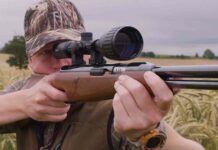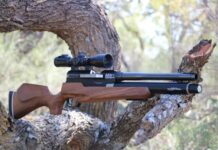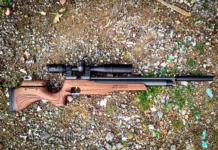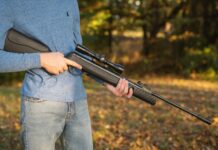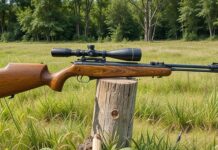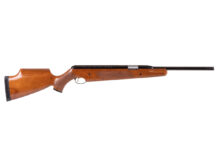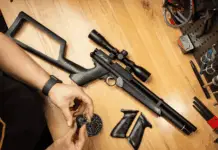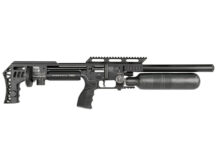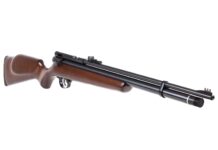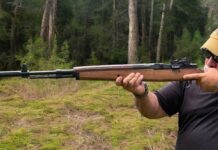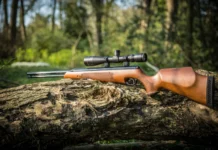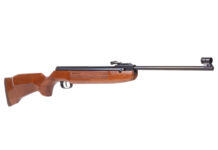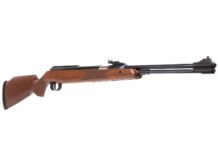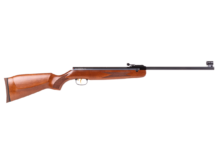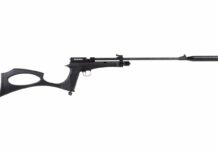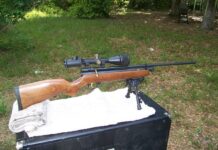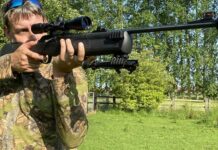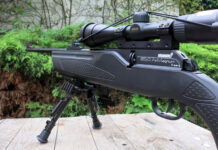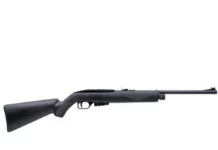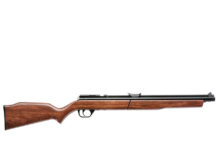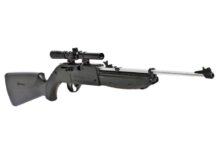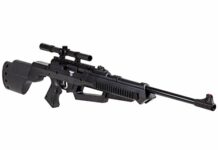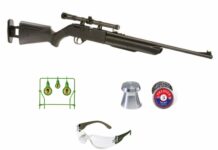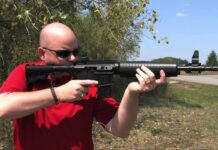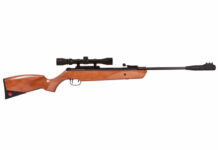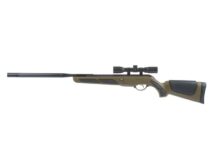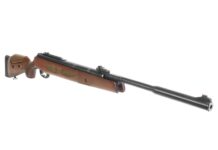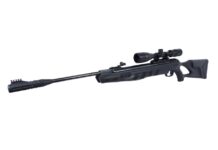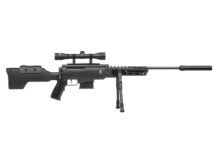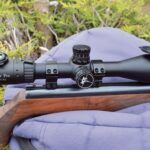This year’s SHOT Show seemed to have finally shaken off the cobwebs of COVID and returned to a resemblance of normal.
The show extension at Caesars Palace, which we previously dubbed the “halls of woe” were bustling with life, too. Overall, this year seemed to be one of production, with companies finally being able to make what they dreamed up over the times of lockdown, but there still was plenty of new and shiny.
As we’ve done at previous SHOT Shows, we handed out awards for standout product releases in four categories:
- Best of Show
- Best Firearm
- Best Accessory
- … and our personal favorite, Best of the Basement
As usual, the discussion surrounding the winners was lengthy, and what you see here only covers what we got handsy with at SHOT Show. But just because we saw a product’s potential doesn’t mean it’ll live up to its maker’s claims — you’ll see full reviews of each in upcoming issues to get the real scoop.
As always, the awards themselves are provided courtesy of LEO Armory in Tucson, Arizona. LEO has a long history with both laser-engraving, and personalized awards and keepsakes.
Following the success of last year’s design, we stuck with the concept of a translucent trophy-in-a-base design featuring our logo and the category being awarded.
Table of Contents
BEST OF SHOW: HOLOSUN DRS
At SHOT Show 2024, Holosun unveiled an exciting new hybrid optic called the Holosun DRS (Digital Reflex Sight), integrating a thermal or digital night vision overlay onto a standard red dot.
Formerly known as the DMS in its prototype phase, the main body appears to be the popular Holosun AEMS, a compact, enclosed-emitter red dot with flip-down lens covers, but with an additional sensor riding on top.

With the new optic, the front cover is opaque instead of clear. Flipped down, the optic works just like a normal red dot with adjustable brightness and Holosun’s typical selectable dot or circle-dot reticles.
When the front lens cover is flipped up, you can press a button to activate the DRS’s secondary optical system, which overlays an image on the front glass (in lower light environments you can run the secondary system without the cover up).
There are three different models of the Holosun DRS. The DRS-NV features digital night vision sensors (think along the same lines as the Sionyx Aurora Pro) with an infrared illuminator. The DRS-TH and DRS-TH Pro are thermal optics with multiple settings (white hot, black hot, fusion, highlight, and outline — in particular, we liked the fusion and outline settings of the DRS-TH) and an optional independent reticle.

The red dot and secondary thermal or NV optic are independent of one another, so during the day you can leave the secondary optic disabled to conserve battery life. Speaking of batteries, the unit is powered by two 18350 rechargeable lithium batteries, which can be charged directly inside the DRS optic via a built-in USB port on the right side of the housing.
That USB port also offers the ability to stream footage to a secondary screen in real-time, so you could connect your DRS to a tablet and use it to observe a static position without getting behind the weapon.
We’ve seen hybrid optics like this before, most notably the Steiner CQT, but certainly not for this price — Holosun hasn’t fully finalized the designs and features of these optics (what you see here came straight from the SHOT Show floor), but we’re told the DRS-NV should be priced under $1,000.

That’s impressive considering an AEMS red dot is nearly half that without the extra optical system on top. As for the thermal DRS-TH, there’ll be a standard model available for approximately $1,600 and a premium, higher-resolution DRS-TH Pro model available for about $2,300. We’ll keep you posted when we have more details.
- Make: Holosun
- Model: DRS-NV / DRS-TH
- MSRP: $TBD
- URL: holosun.com
BEST FIREARM: BOND ARMS TACTICAL LEVER GUN
Our selection for Best Firearm is remarkable for two main reasons:
1) it’s from Bond Arms, and 2) it’s a most unusual take on lever guns.
Bond Arms is certainly not a new company. But their entire product line has traditionally been focused on derringers. While there may be mixed feelings about the relevance of derringers, there’s no doubt that — whether you like them or not — tactical lever guns are in style, in a big way, right now.

The rifle we saw at the Bond Arms booth was still in prototype phase. But, if you’re even thinking of jumping on the “cowboy assault rifle” bandwagon, the Bond Arms contribution has some thought-provoking features.
Not only does this gun run off AR-pattern magazines, but it’ll accept complete AR uppers. The folks at Bond tell us they’ve tested their platform with uppers running .50 Beowulf and not had issues.
The lower receiver accepts any 870-pattern stock, and the booth guns had both Magpul and Hogue stocks on them. To accommodate the stark difference in grip angle between stocks, the lever loop on this gun is dove-tailed into the action bar, so you can swap lever loops when you swap stocks to ensure proper fitment.
Speaking of the lever itself, it doesn’t sit flush against the stock when at rest. This is because the gun has a built-in grip safety — think 1911-style, except it’s on the front. Simply squeeze the lever against the stock, as you would normally hold it, and the safety is disengaged. Finally, the lever system itself works on a dual-cam track that creates different leverage dynamics throughout the course of the lever’s swing.

The angle at which the lever pushes on the bolt is different on the way back as it is on the way forward. Since you need more effort to push an AR BCG forward over the top of the magazine to strip the next round, but less when pushing it backward to eject an empty, this dual-cam system builds in a mechanical advantage that smooths out the lever’s stroke across the operating cycle.
Finally, in one last mash-up of old and new, the gun sports an ambidextrous AR-style mag release and cross-bolt safety. Love it or hate it, this rifle brings a lot of interesting features to the table and goes way beyond the idea of slapping an M-LOK tube on the front of a 150-year-old drive design.
- Make: Bond Arms
- Model: Bond Arms Lever-Action
- MSRP: est. $1,499
- URL: bondarms.com
BEST ACCESSORY: EOTECH OGL
You probably know Michigan-based EOTech for their holographic sights, and especially for the development of the now-ever-popular circle/dot reticle.
But a lot has changed since that first holosight was released in the mid 1990s; in the intervening years, EOTech expanded into variable optics and most recently began producing numerous thermal and IR devices. This year’s SHOT Show saw EOTech pushing further into the i2 device market with their first-ever laser pointing device, the OGL (On-Gun Laser).

Sized right between a ATPIAL AN/PEQ-15 and a Steiner DBAL-A3, the EOTech OGL comes with familiar ergonomics and complete with accessories purchasers normally seek from the aftermarket. The OGL features an estimated nine-hour runtime from a single CR-123A battery and tethered covers. The IR and visible green lasers are slaved for a single zero.
We like that the controls match the AN/PEQ-15, and we particularly like the beam divergence lever — gliding the infrared illuminator from a spot to a flood is smooth with just the right amount of give.
The EOTech OGL is also bundled with a bevy of pattern generators and the popular-for-a-reason Modlite Modbutton with a 7-inch cable.

It also accepts any Crane Standard PTT switch (you can see it gracing our cover and elsewhere in this issue wearing a SureFire SR dual tape switch). The first models released are mil/LE-restricted, but the folks at EOTech have assured us that an unrestricted model is soon to follow.
Available in gray and FDE, full boat MSRP of the OGL sits just below $2,200.
- Make: EOTech Inc
- Model: OGL
- MSRP: $2,199
- URL: eotechinc.com
BEST OF THE BASEMENT: REVOLVE TACTICAL TRIPOD
Tripods have proven themselves extremely useful to shooters, whether for recreation, hunting, competition, or tactical applications. They provide a steady platform for both shooting as well as spotting and observing. For years, shooters have adapted photography tripods for their purposes.

But the basic design of a tripod essentially hasn’t changed — three long legs attached to hinges with a head on top. Manufacturers have taken advantage of materials, such as aluminum and carbon fiber, to reduce weight. However, the legs themselves still take up quite a bit of space — telescoping designs nest leg sections within each other so they can extend for use and collapse for transport.
However, you can only have so many sections and make them so narrow before you really compromise rigidity. So even compact tripods still collapse into cumbersomely long packages — and the sturdier you go, the longer, girthier, and heavier they are.

Rolatube is a British company that manufactures a unique rollable composite material —think of it as a reverse slap bracelet. Envision a long rectangle that can flatten and roll up along the long side for compact storage. But when you unroll it, it snaps into place as a rigid tube. Some of their core products to date include lightweight communications mast systems used by the military and inspection booms for industrial applications.
Expanding into new product segments, they realized that their rollable material could be used for an ultra-compact tripod — the Revolve Tactical Tripod. With legs made of their composite, you can flatten and roll them up for storage, making for a complete tripod system that fits in an impossibly small 6×7-inch bag. Once deployed, you snap the tubes into a polymer head and secure feet to the ends.

The head includes a short center column to provide some height adjustment since the legs are fixed length (short and long legs are included). Hinges allow the legs to spread out and lock at specified angles, like regular tripods. Revolve had pre-production samples at the show, rated to a load capacity of approximately 44 pounds and with deck heights ranging from 6 to 51 inches.
Revolve will enter production later in the year with pricing to be determined.
- Make: Revolve
- Model: Tactical Tripod
- MSRP: $TBD
- URL: revolve-tec.com
